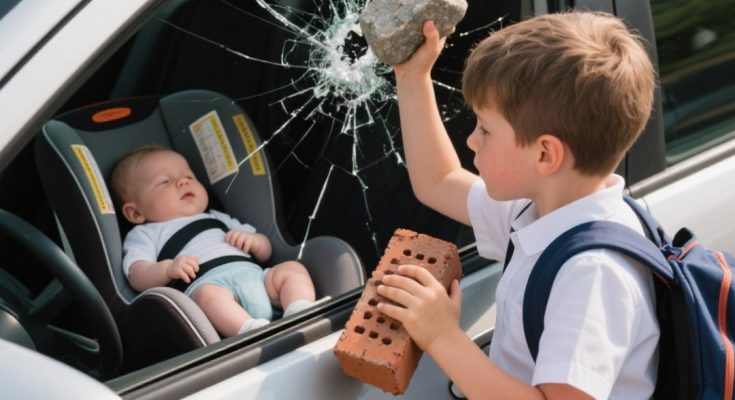Eight-year-old Liam Parker was late for school—again. His backpack bounced as he dashed across the grocery store parking lot, hoping to make up time. Mrs. Grant, his teacher, had already warned him: one more tardy, and she’d be calling his parents.
But as he passed a silver sedan parked under the sun, he froze. Inside, strapped in a car seat, a baby’s tiny face was flushed and streaked with tears. The cries were faint through the closed windows, and beads of sweat glimmered on the infant’s skin. No adult was nearby, and every door was locked.

Liam’s heart pounded. He tapped on the glass, waiting for someone to show up, but the lot was empty. He circled the car, pulling at each handle — all locked. The baby’s cries faded into weak, hoarse whimpers.
He looked toward the road. School was just a few blocks away, but walking off felt impossible. Every second mattered.
With trembling hands, Liam picked up a heavy rock from the curb. Lifting it high, he whispered, “I’m sorry, Mister Car,” and brought it down hard against the window. The glass splintered, spiderwebbed, and finally gave way.
He unbuckled the baby and lifted the child into his arms. The baby’s damp skin clung to his shirt. “It’s okay, you’re safe now,” he murmured.
Then a woman’s scream tore through the air. “What are you doing to my car?!”
Liam froze.
The woman sprinted toward him, groceries spilling from her arms. Her eyes widened at the sight — the shattered window, the boy holding her baby. Then, realization replaced anger.
“Oh my God… I was only inside for ten minutes—” she gasped, clutching her child and covering his face in frantic kisses. Tears streamed down her cheeks. “Thank you, thank you.”
Before Liam could say a word, the school bell rang. His stomach sank. He bolted toward school, running as fast as his legs would carry him.
He burst into the classroom minutes later, hair plastered to his forehead, hands scraped from the glass. Mrs. Grant stood at the front, arms folded, expression stern.
“Liam Parker,” she said sharply. “You’re late again.”
The room fell silent. Liam opened his mouth but hesitated. How could he explain without sounding like he was making excuses?
“I—I’m sorry, Mrs. Grant,” he said quietly.
“That’s it,” she replied firmly. “We’ll be calling your parents this afternoon. You need to learn responsibility.”
Liam bowed his head, cheeks burning. No one applauded. No one thanked him. He sat quietly, staring at the tiny cuts on his palms, wondering if maybe he’d done the wrong thing.
At recess, some kids teased him for being late again; others ignored him. Liam stayed quiet, replaying the baby’s tear-streaked face in his mind. He knew he’d do it again, even if nobody believed him.
But he didn’t know the woman from the parking lot had followed him to school—and she was about to step inside his classroom.
“Mrs. Grant,” the principal said, “we have something important to share.”

The woman stepped forward, voice trembling.
“This little boy saved my baby’s life today. I left him in the car for what I thought was just a few minutes. It was a terrible mistake. When I came back, Liam had already broken the window and pulled him out. If not for him…” Her voice cracked as she hugged her child tighter.
The room went silent. Every eye turned to Liam. His cheeks flushed again, but this time from pride.
Mrs. Grant’s tone softened. “Liam… why didn’t you say something?”
“I thought… you wouldn’t believe me,” he whispered.
For the first time all year, Mrs. Grant knelt beside him and laid a hand on his shoulder. “You didn’t just save a baby. You reminded us what real courage looks like.”
The class erupted in applause. Some kids shouted, “Hero!” Liam’s eyes stung, but he smiled shyly, gripping the edge of his desk.
The woman leaned down and kissed his forehead. “You’ll always be part of our family’s story. We’ll never forget what you did.”
That night, when his parents called—not with anger but pride—they hugged him tight and told him how proud they were.
Liam went to bed knowing one thing: sometimes doing what’s right means being misunderstood first. But in the end, the truth always comes through.
And for the boy who thought he was “always late,” Liam had learned that when it really mattered, he was right on time.
That afternoon, just before dismissal, the classroom door creaked open. The principal walked in—followed by the woman Liam had saved, her baby calm in her arms.



